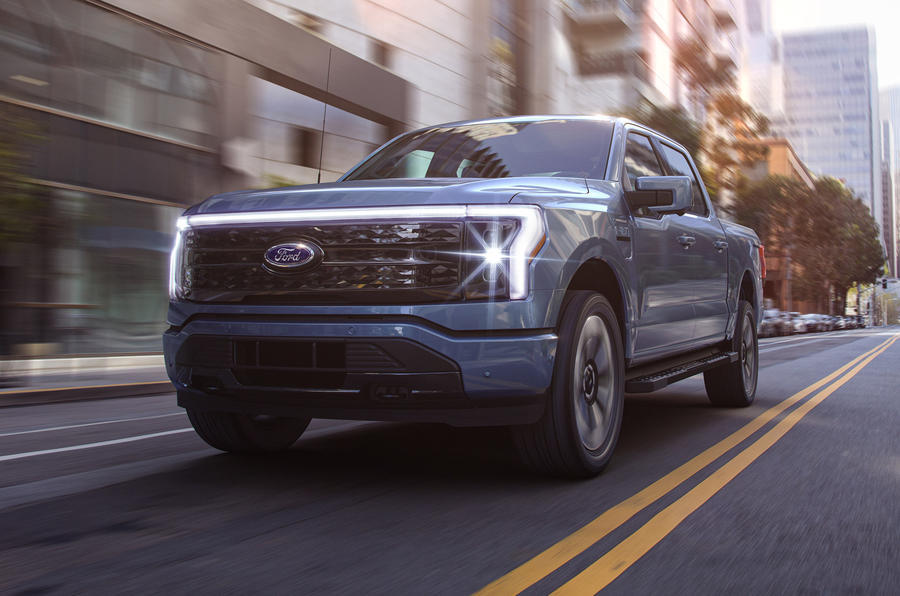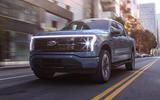Does anyone say wonder why Ford boss Jim Farley and Tesla’s Elon Musk are trying to kill each other with kindness at present?
The outpouring of warm words following the launch of the electric Ford F-150 Lightning can surely only mask darker thoughts as the two get set to fight in the lucrative US pick-up market.
Tesla has the Cybertruck on the way – or at least, it’s meant to. Unveiled in 2019 to much fanfare (mostly for its looks and partly because a window smashed when Musk tried to demonstrate its bulletproofness), its late-2021 launch is rumoured to have been pushed back due to issues including getting its outlandish styling to meet crash regulations.
To receive the latest industry news, please click here to sign up to the Autocar Business newsletter
Meanwhile, a few weeks ago, Ford (whose financial fortunes have in recent years often been driven more by its American trucks than its entire European business) got a jump by confirming that the F-150 Lightning will reach buyers next year.
Potentially, the two trucks will arrive in showrooms at the same time. Order slots for both can be secured with a refundable $100 deposit; Musk claimed 250,000 in the first week after unveiling and Farley declared 50,000 after just 48 hours – both of which are strong figures in a country where EV sales are still below 2% of the total.

Cybertruck versus F-150 Lightning, then, has all the makings of war, particularly when you consider the cash at stake, the F-Series taking more than 750,000 annual sales and having been rated by Bernstein Research almost a decade ago to have raked in £35bn before interest and taxes. Investing in new tech won’t help that return but should extend it.








Join the debate
Add your comment
Could it be Musk wants the ALL to succeed since the entire goal from the beginning was tk lead the world to sustainable / renewable energy????
Re: RMB
Tesla have the capacity to produce 1.1 million cars at the moment, by some time next year they will have the capacity to produce over 2 million.
Given that those cars bring in $56,000 per sale they are in no way a small manufacturer. In fact that run rate would take them past BMW in revenue some time in 2022/23.
They aren't going to get into battery and component supply until the market for Tesla's is saturated. At the moment $10,000 of electric drive train unlocks $56,000 of car sales, they make a 20-25% margin on those car sales. It would be foolish to swap that for a lower margin on a component 1/5 the value of the car especially when what is constraining their car sales is the supply of those batteries.
Remember the "Tesla killers", the first generation practical EVs from mainstream manufacturers. They were going to catch up in electric drivetrain technology before using their economies of scale to crush Tesla.
In practice none of them sold more than 10,000s per year versus the 100,000s of thousands the Model 3 & Y sell at the moment. You still get the odd story about e-Tron or EQS "crushing Tesla", in a tiny market where monthly sales are depend on which car transporter has docked that month.
Three points:
1: Normal manufacturers making EVs mean that a more cautious section of the buying public will consider one. Tesla still make the most compelling EV offering so they will get a portion of those new buyers.
2: Tesla only need to retain their share of the EV market to be by far the worlds largest car manufacturer by revenue. They will manage to do this even if they made average EVs because they are scaling up production 2-3 years ahead of the rest of the market. As Elon Musk frequently points out their real product is the Gigafactory.
3: If somebody else has some compelling tech they will just copy it and improve on it reactively as their decision making process is much more streamlined. If the Cybertruck doesn't work (which I think is unlikely, see above point you only need to convince a few % of the car buying public to have the worlds best selling car) they will just make a more conventional one.